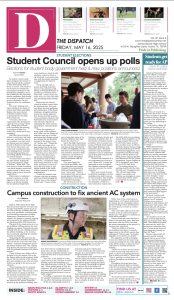AISD bond approval brings positive reactions
December 14, 2017
November 7th, Austin citizens voted for the approval of a historic bond. This meant that AISD would receive over $1 billion to improve, modernize, and build new schools within the district.
Specifically, Bowie is on track to receive a parking garage, renovated and expanded athletics facilities, new and expanded fine arts facility, and technology improvements.
Along with new projects, there’s also a large portion of money set for the up-keeping of preexisting parts of the school. This includes things like air conditioning and heating improvements. The everyday life for students will significantly change.
If done properly, this will have a great impact on all AISD schools. It’s important that we celebrate the passing of this bond not only because it’ll improve schools across the city immensely but because it showed the care within our tight -knit community.
Many individuals were very dedicated to the passing of the bond whether it was through signs in their front yard or standing in front of Bowie on voting day to remind people to vote. The bond’s benefits were shared on Facebook or promoted in organizations and groups by passionate parents.
But as a community, we cannot stop caring from this point on now that it’s passed. Things can still change and it is the people’s responsibility to speak up and keep AISD in check as many people have already done.
There were a few big reasons why some were against the bond passing. Some citizens believed East Austin schools were not getting the attention they deserved and the distribution of money and care was unfair. Many perceived the situation as West Austin being favored. This promoted ideas of gentrification and institutional racism in their eyes.
They make a good point but the plans were carefully thought out and schools’ funds were not just selected randomly. Ideas were exchanged through an extensive, two-year community involved process where Austin neighborhoods were approached about what their schools needed. Also, every school is on track to benefit from the bond.
Although Bowie is in a nice, fairly wealthy area of Austin, it was in need of attention. This was not because of poor, under-performing facilities but rather an overcrowded school.
Bowie’s major extensions and improvements are in place of building a new high school which would have been more expensive. The district is saving time and money by making this choice. The careful planning behind Bowie’s future shows the bond was well thought out.
Another concern is that the school district has been consistently successful in paying for the bonds in the past but they have never managed one this big. With this being the largest bond in district history, Austin citizens worry they won’t be able to pay all of it which will force them to alter taxes. The district has maintained that taxes for Austin citizens will not go up, but some believe this concept is impossible.
The school district is making it possible through a financial method of borrowing and repaying in intervals. They will borrow and pay off the debt as they go rather than borrow the whole billion right at the beginning. This tactic is financially safer for AISD and helps keep taxes consistent for Austin citizens.
With big plans and visions, there is a lot of room for things to go wrong or off track. One aspect could cost more than expected or a school could need sudden treatment which would alter the plans for another school. The district may not borrow the full $1 billion in fear that they won’t be able to pay it all back, meaning some projects could be cut. The projects are prioritized by “worst first” which makes these “concrete” plans subject to change. It’s very important for the voters to get what they voted for in the first place.
This is a time to celebrate the bond’s passing because it has the potential to improve public education greatly. If all the plans go through, students’ experience will be modernized and enhanced. However, the community should stay as involved as they were to get it passed in the first place.









